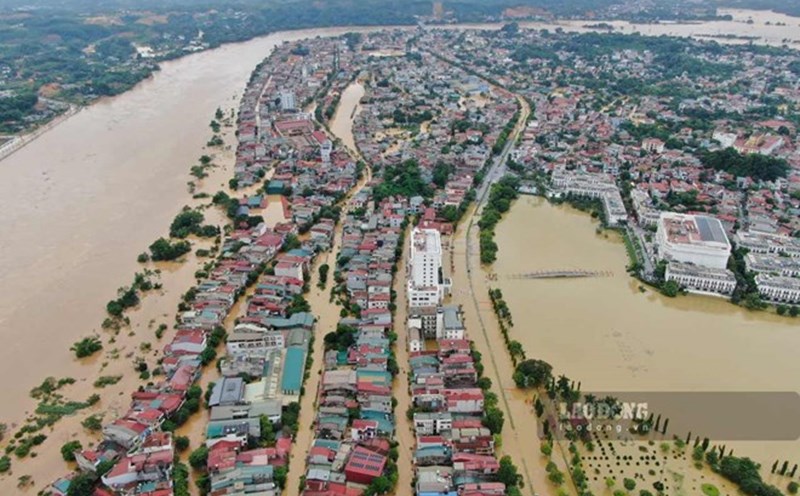According to statistics, each flash flood carries household waste, mud, manure, wastewater from toilets, barns, along with chemicals stored in agricultural warehouses, pesticides... mixed into the water. When the water rises, the wastewater treatment system and sewers are destroyed, and stagnant dirt flows into the environment. As a result, domestic water sources are heavily polluted, trees die, cattle and poultry carcasses decompose, causing epidemics for both humans and animals.
In fact, in many localities after the storm, people have to live in foul air, black stagnant water and many flies. This is an ideal condition for chills, welding, dengue fever, and intestinal inflammation to break out. Lessons from many floods show that cleaning work must be carried out immediately as soon as the water recedes. If left for a long time, silt and garbage will stick to houses, gardens, and streets, it will be difficult to completely clean up. Therefore, the motto "where the water recedes, do it cleanly" needs to be applied synchronously in the community.
This work includes: Clearing mud, clearing sewers, filling prison mud, burying animal carcasses, and clearing polluted areas. Families need to dry clothes and blankets, absolutely do not let them get wet to create shelter for mosquitoes. However, the repair of waste houses and barns must also be implemented to prevent waste from continuing to be discharged into the environment.
One of the difficult problems after the flood is handling dead cattle and poultry. If left untreated, this is a dangerous source of infection. According to professional instructions, it is necessary to survey the number of carcasses, choose a burial location outside the field, at least 50m from the water source, or in the garden but must be at least 30m from the well. The burial pit must be deep, covered with lime powder or disinfectant chemicals, then filled in, and have signs posted. In particular, it is necessary to check every day to prevent pets from digging and handling immediately if there is a foul smell. This is an important step to prevent diseases from poultry and livestock transmission to humans - something that has happened in many areas after natural disasters.
Cleaning work after storms and floods cannot be the responsibility of each household but requires synchronous coordination. Environmental sanitation after storms and floods is not just about cleaning up before the eyes. That is also an important step in a long-term epidemic prevention strategy. For each natural disaster that passes, it is necessary to learn from experience and develop a prepared response plan: Depository of disinfectants, mechanical means, and specialized teams.
No one hopes for natural disasters to happen, but when it has become a seasonal law, proactive preparation and organization of scientific cleaning after storms and floods are the key to protecting public health and stabilizing life quickly. It is not only an action for the present, but also a responsibility for the future, so that the lands that were once struggling in storms and floods can soon revive to green, clean and safe.
Millions of arms turn to compatriots affected by storms and floods
Consecutive storms No. 8, 9, 10 and floods caused by the storm have killed 19 people and many people are missing. Many houses and production and business establishments had their roofs blown off and suffered heavy damage. People across the northern and central mountainous provinces are struggling to cope with floods and heavy losses in human lives and property due to floods and thunderstorms.
"A piece of food when hungry is worth a package when full", with the spirit of mutual love that has always been a beautiful image of the Vietnamese people, the Golden Heart Social Charity Fund calls on domestic and foreign philanthropists to join hands to share with people affected by floods to have food, clothing, shelter, students have books to go to school...
The Golden Heart Social Charity Fund would like to sincerely thank the precious feelings of agencies, businesses, and domestic and foreign philanthropists.
All help please send to: The socialist fund of the golden heart, No. 51 Hang Bo, Hoan Kiem, Hanoi. Phone: 024.39232756. Account number (STK): 113000000758 at VietinBank Hoan Kiem Branch, Hanoi. STK: 0021000303088 - At Vietcombank - Hanoi Branch, STK: 12410001122556 - At BIDV - Hoan Kiem Branch. Or scan the following QR code:

Millions of arms turn to compatriots affected by storms and floods
Consecutive storms No. 8, 9, 10 and floods caused by the storm have killed 19 people and many people are missing. Many houses and production and business establishments had their roofs blown off and suffered heavy damage. People across the northern and central mountainous provinces are struggling to cope with floods and heavy losses in human lives and property due to floods and thunderstorms.
"A piece of food when hungry is worth a package when full", with the spirit of mutual love that has always been a beautiful image of the Vietnamese people, the Golden Heart Social Charity Fund calls on domestic and foreign philanthropists to join hands to share with people affected by floods to have food, clothing, shelter, students have books to go to school...
The Golden Heart Social Charity Fund would like to sincerely thank the precious feelings of agencies, businesses, and domestic and foreign philanthropists.
All help please send to: The socialist fund of the golden heart, No. 51 Hang Bo, Hoan Kiem, Hanoi. Phone: 024.39232756. Account number (STK): 113000000758 at VietinBank Hoan Kiem Branch, Hanoi. STK: 0021000303088 - At Vietcombank - Hanoi Branch, STK: 12410001122556 - At BIDV - Hoan Kiem Branch. Or scan the following QR code:











